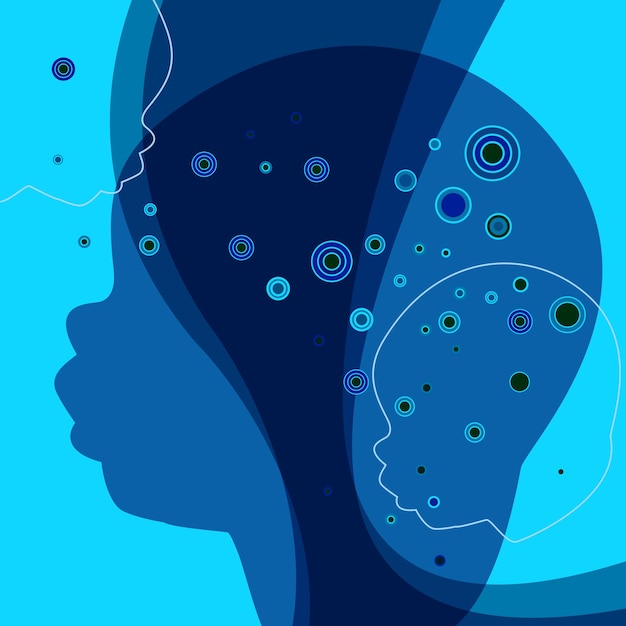Federal Digital Privacy Act 2025: Impact on Mental Health App Use

The Federal Digital Privacy Act 2025 aims to strengthen data protection, significantly impacting how mental health apps collect, use, and share user data, potentially enhancing privacy but requiring adjustments from both users and developers.
Navigating the digital landscape can be tricky, especially when it comes to our personal data. With the impending Federal Digital Privacy Act 2025, understanding how it affects your mental health app usage is crucial for safeguarding your sensitive information. Let’s delve into what this act entails and how it might change the way you interact with these apps.
Understanding the Federal Digital Privacy Act 2025
The Federal Digital Privacy Act 2025 is a landmark piece of legislation designed to modernize data privacy laws in the United States. It aims to give individuals greater control over their personal information and hold organizations accountable for how they collect, use, and share this data. Understanding the key tenets of this act is the first step in appreciating its impact on mental health apps.
Key Provisions of the Act
Several provisions of the Federal Digital Privacy Act 2025 are particularly relevant to mental health app usage. These include:
- Data Minimization: Companies must limit data collection to what is strictly necessary for providing their services.
- Purpose Limitation: Personal data can only be used for the specific purposes disclosed to users.
- Data Security: Organizations must implement reasonable security measures to protect personal data from unauthorized access.
- Transparency: Companies must provide clear and accessible information about their data practices.
This act essentially sets higher standards for how personal information is handled, which is especially important for sensitive data collected by mental health applications.

Impact on Data Collection and Usage by Mental Health Apps
Mental health apps often collect a wide range of data, from mood logs and sleep patterns to therapy session transcripts. The Federal Digital Privacy Act 2025 directly impacts the scope and methods of this data collection. Let’s investigate how these changes affect the daily operation of these apps.
Changes in Data Collection Practices
One of the most significant changes is the emphasis on data minimization. Apps will need to justify every piece of data they collect, ensuring it is directly related to the services they provide. For instance, an app might need to explicitly explain why it needs access to your location data and obtain your consent.
User Consent and Control
The Act also empowers users with greater control over their data through enhanced consent mechanisms.
- Informed Consent: Users must be provided with clear, concise, and easily understandable information about data collection practices.
- Revocable Consent: Users must have the ability to withdraw their consent at any time.
- Granular Consent: Apps may need to obtain separate consent for different types of data processing activities.
This shift towards user-centric data practices will likely lead to more transparent and respectful relationships between users and mental health app providers.
How the Act Affects Data Sharing and Third Parties
Data sharing with third parties is a common practice in the app ecosystem, but the Federal Digital Privacy Act 2025 imposes stricter rules on this activity. Understanding these regulations is critical for app users. Let’s investigate how these changes are impacting the sharing and security of sensitive health app data.
Restrictions on Data Sharing
The Act restricts the sharing of personal data with third parties unless certain conditions are met. For instance, apps must obtain explicit consent from users before sharing their data with advertisers or research institutions. Data sharing agreements must also include provisions ensuring that third parties adhere to the same privacy and security standards.
Accountability for Third-Party Practices
Mental health app developers are now more accountable for the data practices of their third-party partners.
- Due Diligence: Developers must conduct thorough due diligence to ensure that third parties have adequate data protection measures in place.
- Contractual Obligations: Data sharing agreements must include provisions that hold third parties accountable for data breaches or misuse.
- Ongoing Monitoring: Developers must continuously monitor the data practices of their third-party partners to ensure compliance.
These measures aim to prevent data from being shared irresponsibly and protect users from potential harm.

Enhanced Security Requirements for Mental Health Apps
Data breaches and security vulnerabilities are a major concern in the digital age. The Federal Digital Privacy Act 2025 mandates enhanced security requirements for mental health apps, aiming to protect sensitive user data from unauthorized access. These new requirements mandate higher standards of security for application developers and users alike.
Mandatory Security Measures
The Act requires mental health app developers to implement a range of security measures, including:
- Encryption: Data must be encrypted both in transit and at rest.
- Access Controls: Access to personal data must be restricted to authorized personnel.
- Regular Audits: Security systems must be regularly audited to identify and address vulnerabilities.
These measures create a more secure environment for user data, reducing the risk of breaches and unauthorized access.
User Responsibilities in Data Security
While developers are responsible for implementing security measures, users also have a role to play in protecting their data.
- Strong Passwords: Use strong, unique passwords for your mental health app accounts.
- Software Updates: Keep your apps and operating systems up to date with the latest security patches.
- Privacy Settings: Review and adjust your privacy settings within the apps to limit data collection and sharing.
By working together, developers and users can create a robust defense against data breaches and security threats.
The Role of Transparency and Accountability
Transparency and accountability are core principles of the Federal Digital Privacy Act 2025. These principles aim to ensure that organizations are open about their data practices and held responsible for any violations of the law. These measures offer a way to provide consumers with assurances of privacy and security.
Clear and Accessible Privacy Policies
The Act requires mental health apps to provide clear and accessible privacy policies that explain:
- Data Collection Practices: What types of data are collected and how it is collected.
- Data Usage Purposes: How the data is used and for what purposes.
- Data Sharing Practices: With whom the data is shared and under what circumstances.
Enforcement and Penalties
To ensure compliance, the Act establishes a robust enforcement mechanism.
By making these principles central to the regulation of mental health apps, the Act seeks to foster a culture of trust and responsible data handling.
Navigating the Future of Mental Health Apps Under the Act
The Federal Digital Privacy Act 2025 is reshaping the landscape of mental health apps, presenting both challenges and opportunities for developers and users. Adapting to these changes will be crucial for ensuring that these apps remain valuable tools for supporting mental well-being. As these apps develop, they will need to respond to the challenges presented by this new legislation.
For Developers: Building Trust and Compliance
Developers need to prioritize privacy and security in their app design and development processes. This includes:
- Privacy-Enhancing Technologies: Implement technologies like differential privacy and federated learning to minimize data collection.
- User-Centric Design: Design apps with user privacy in mind, providing clear and intuitive controls over data.
- Continuous Monitoring: Continuously monitor their data practices and adapt to evolving regulatory requirements.
For Users: Making Informed Choices
Users need to take an active role in protecting their privacy by:
- Reading Privacy Policies: Carefully review the privacy policies of mental health apps before using them.
- Adjusting Privacy Settings: Customize privacy settings to limit data collection and sharing.
- Seeking Alternatives: Consider using privacy-focused apps that prioritize user data protection.
By embracing these strategies, developers and users can navigate the future of mental health apps in a way that protects privacy while still harnessing the power of technology to improve mental well-being.
| Key Aspect | Brief Description |
|---|---|
| 🛡️ Data Minimization | Apps collect only necessary data. |
| 🔑 User Consent | Users have more control over their data. |
| 🔒 Enhanced Security | Stronger measures protect user data. |
| 🤝 Data Sharing | Sharing with third parties is restricted. |
Frequently Asked Questions
▼
The Federal Digital Privacy Act 2025 is a new law designed to protect personal data. It gives individuals more control over their information and holds organizations accountable for data handling.
▼
The Act imposes stricter rules on data collection, usage, and sharing. Mental health apps must now prioritize data minimization, user consent, and enhanced security measures.
▼
Use strong passwords, keep your apps updated, review privacy policies, and adjust your privacy settings. Be mindful of the data you share and choose apps that prioritize privacy.
▼
Yes, organizations that violate the Act can face significant penalties, including fines and legal action. The enforcement mechanisms are designed to ensure compliance and protect user privacy.
▼
You can find detailed information on the official government websites and from privacy advocacy groups. These resources provide comprehensive insights into the Act’s provisions and implications.
Conclusion
The Federal Digital Privacy Act 2025 signifies a major step towards protecting personal data in the digital age. By understanding its implications and taking proactive steps, both developers and users of mental health apps can navigate this evolving landscape responsibly, promoting both innovation and privacy.